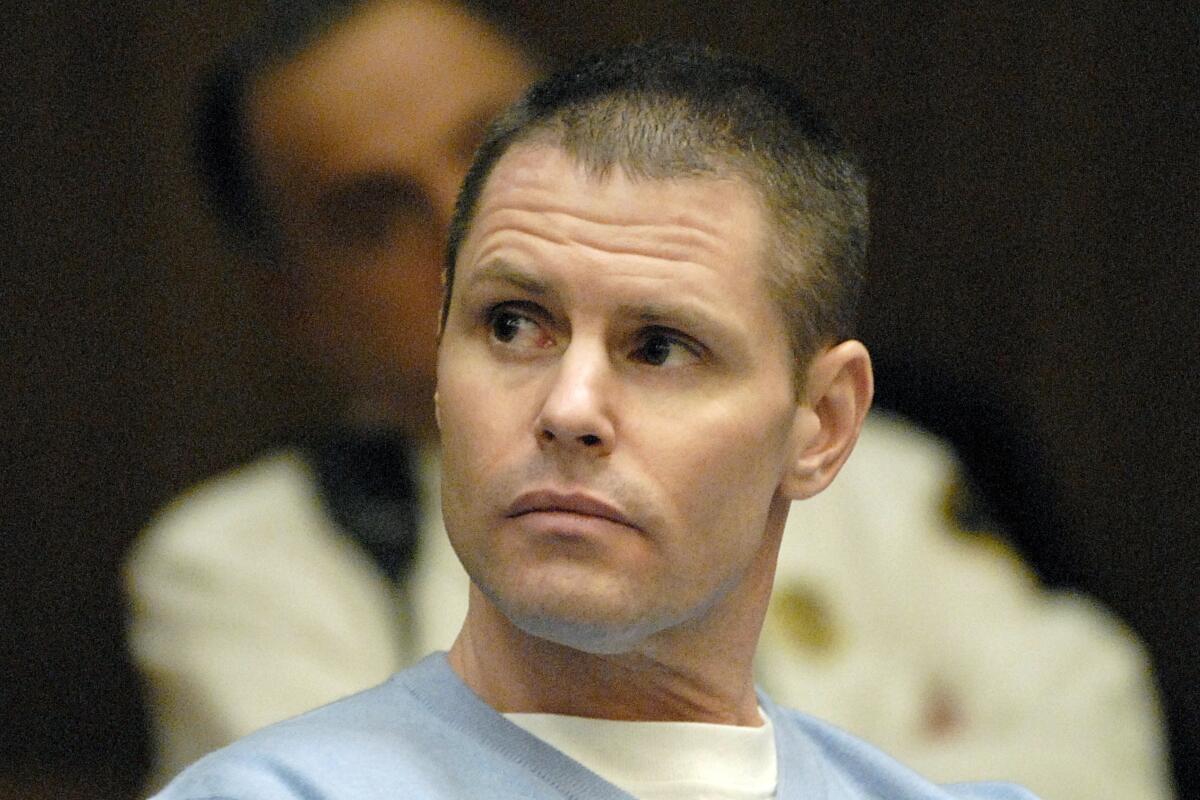An ex-Mafia hit man is sentenced to 25 years in the slaying of gangster James ‘Whitey’ Bulger

- Share via
CLARKSBURG, W.Va. — A former Mafia hit man was sentenced to 25 years in prison Friday in the 2018 fatal prison bludgeoning of notorious Boston gangster James “Whitey” Bulger.
Federal prisoner Fotios “Freddy” Geas was sentenced in federal court in northern West Virginia after pleading guilty to voluntary manslaughter and assault resulting in serious bodily injury.
Prosecutors said Geas used a lock attached to a belt to repeatedly hit the 89-year-old Bulger in the head hours after he arrived at the Hazelton penitentiary in West Virginia from a lockup in Florida in October 2018. Defense attorneys disputed that characterization, saying Geas hit Bulger with his fist.
Geas, 57, already was serving a life sentence for previous violent crimes. The Justice Department said last year that it would not seek the death penalty against him in Bulger’s killing.
Bulger, who ran the largely Irish gang in Boston in the 1970s and ’80s, also informed the FBI on his gang’s main rival, according to the bureau. Bulger strongly denied ever being a government informant.
Bulger became one of the nation’s most wanted fugitives after fleeing Boston in 1994 thanks to a tip from his FBI handler that he was about to be indicted. He was captured in Santa Monica at age 81 after more than 16 years on the run and convicted in 2013 in 11 killings and dozens of other gangland crimes.
Another Hazelton prisoner, Massachusetts gangster Paul J. DeCologero, was sentenced to more than four years in August on an assault charge in Bulger’s killing. Prosecutors said he acted as a lookout for Geas. A third inmate, Sean McKinnon, pleaded guilty in June to lying to FBI special agents. McKinnon was given no additional prison time and was returned to Florida to finish his supervised release. He had served a sentence for stealing guns from a firearms dealer.
According to court records, prisoners found out ahead of time that Bulger would be arriving at the West Virginia facility. DeCologero and Geas spent about seven minutes in Bulger’s cell during the attack, according to the records.
A prisoner testified to a grand jury that DeCologero told him Bulger was a “snitch” and they planned to kill him as soon as he came into their unit.
Geas was a close associate of the Mafia and acted as an enforcer but was not an official “made” member because he is Greek, not Italian. He and his brother were sentenced to life in 2011 for their roles in several violent crimes, including the 2003 killing of Adolfo “Big Al” Bruno, a Genovese crime family boss, in Springfield, Mass. Another mobster ordered Bruno’s killing because he was upset that Bruno had talked to the FBI, prosecutors said.
Plea deals for Geas, DeCologero and McKinnon were disclosed May 13. Geas and DeCologero were identified as suspects shortly after Bulger’s death, but they remained uncharged for years as the investigation dragged on.
After the killing, experts criticized Bulger’s transfer to Hazelton, where workers had already been sounding the alarm about violence and understaffing, and his placement in the general population instead of more protective housing.
A Justice Department inspector general investigation found in 2022 that the killing was the result of multiple layers of management failures, widespread incompetence and flawed policies at the federal Bureau of Prisons. The inspector general found no evidence of “malicious intent” by any bureau employees but said a series of bureaucratic blunders left Bulger at the mercy of rival gangsters.
That year, a federal judge dismissed a lawsuit filed by Bulger’s family against the bureau and 30 unidentified prison system employees.
In July, the U.S. Senate passed legislation to overhaul oversight and bring greater transparency to the bureau following reporting from the Associated Press that exposed systemic corruption in the federal prison system and led to increased congressional scrutiny.
Raby writes for the Associated Press.
More to Read
Sign up for Essential California
The most important California stories and recommendations in your inbox every morning.
You may occasionally receive promotional content from the Los Angeles Times.










